Commons.fi and visiting RIPESS European coordination team participated at the Pixelache2017 Local and Decentralised Festival. While Commons.fi already was to participate at the festival, the possibility of having the RIPESS team over was a great opportunity to share insights and strengthen the objectives of Commons.fi.
The first workshop Wednesday evening concerned mapping. The discussions revolved mainly around the question of mapping the commons: “why, what, how, and who?”. To begin with, Jason Nardi (RIPESS, Solidarius Italia) illustrated the historical roots of a global movement of solidarity economy in which mapping has been used to visualise various networks on international, regional and sectoral levels.
We went over the experiences of Commons.fi mapping with TransforMap. This mapping tool is used to give visibility to the solidarity economy actors involved with building alternative economies. Also, mapping is used to visualise the contours of “the other economy” that Common.fi is advocating towards the City of Helsinki and the new city council strategy formation.
This kind of advocacy work has been done by Commons.fi member Helsinki Timebank (and others) in a number of seminars (most prominently the Alternative Financial System and Money for Finland discussion series) and workshops with city council representatives. The point has been to illustrate how complementary currencies can build up other economies and strengthen local communities.
Mapping can also be about the conscious slow building of a network. This was the original intention of Commons.fi. Luca Asperius (RIPESS, Italia che Cambia, Berlin Im Wandel) shared his thoughts on how mapping can be supplemented with video interviews of participating organisations and projects, which can thus also serve a more “distant” purpose of documentation.
For the festival, Tuomo Alhojärvi (Commons.fi) curated a new low-tech mapping tool that allows for free expression in order to collect stories about Helsinki and the different sorts of commoning that each and every one takes part in. The tool, inspired by the project “Notes for a People’s Atlas” that started in Chicago in 2005, goes currently by the same name. The intention is to continue with this mapping tool into the future, in order to produce colourful multitude of visions and stories. The Pixelache Festival goers got to start this process and they produced a nice map wall during the next few days. Below is an wonderful example by Maija Lumme (Commons.fi).
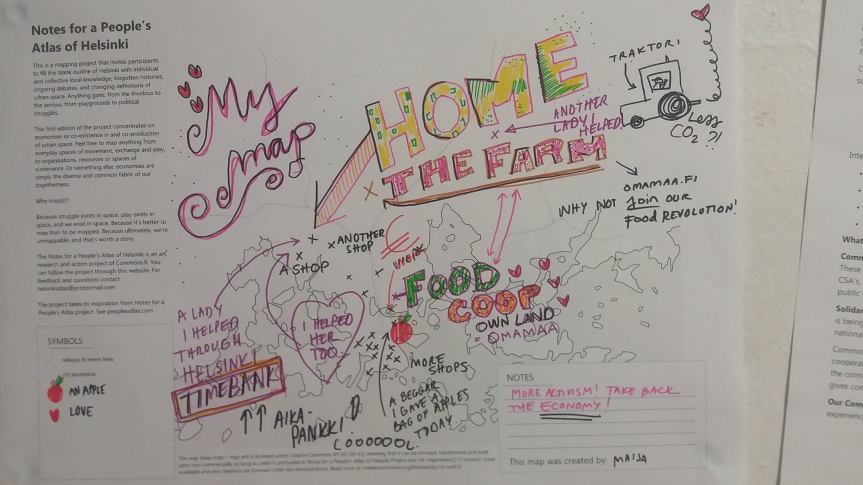
A second discussion prior to the festival was held at Siemenpuu Foundation, an environmental foundation supporting partners in the Global South working on issues of ecological democracy. The discussion focused on the World Social Forum (WSF) process and other important democracy initiatives.
Sharing on the WSF process with comrades bringing in history, experiences and updates from elsewhere was valuable. Finland has had lively social forums organised both in Helsinki and Tampere, and the next Finnish Social Forum will be organised in April 2018 in Helsinki. It was also interesting to consider the recent and ongoing wave of municipalism sweeping through several cities of Europe: how could we come to see the role of social forums in these processes of democratisation in Helsinki and in Finland?

On Thursday 21.9. at the beginning of the Assembly process of the festival, Ruby van der Wekken (Commons.fi) gave a talk on the challenges that constitute the necessary core of commoning around a commons. In her talk, Ruby revisited the experiences of Helsinki Timebank. She focused on the future by talking about where these experiences of commoning could lead us, including also an engagement with the public sphere in order to achieve the desired change. Engaging with political entities and processes of the City of Helsinki was a key subject matter of the Assembly process during the three evenings of the festival.
Two separate yet connected themes were discussed during the Assembly: firstly, that of urban planning and decentralisation, which carried a specific emphasis on the desires to come up with a participatory planning process for Suvilahti. Secondly there was the theme asking What economy for Helsinki?, aiming to strengthen a common vision of advocacy towards the city strategy, policy and officials.
For the latter thematic thread, Jason Nardi’s (RIPESS, Solidarius Italia) story on the development of the Forum of the Commons was particularly inspiring: the Forum has come to the creation of bylaws to facilitate the partnerships among groups that want to co-manage public space and policy. At another instance, Jason also shared how different kinds of mapping methods were used in building up the Forum. For example, people in different parts of the town came together to map their local economies, or to map initiatives relating to certain themes like food or energy.
One outcome of this Assembly process was to continue with the call towards a “Forum of the Commons” in Helsinki, with a next physical meeting in the nearby future. Commons.fi has been spearheading the idea of establishing a body for solidarity economy and commoning to strengthen and to facilitate the engagement with the city. We want to invite all commons groups to participate in the next meeting — watch this space for further details!
Saturday night was spent at the café of Oma Maa, the organic food cooperative member of Commons.fi. Over a great meal, our discussions on the manifold ways in which people can get local organic food on their plates led also to the “mother of debates”: how change happens as the debate between the pullers (working on the inside for reform) and the pushers (aiming at structural change from the outside.)
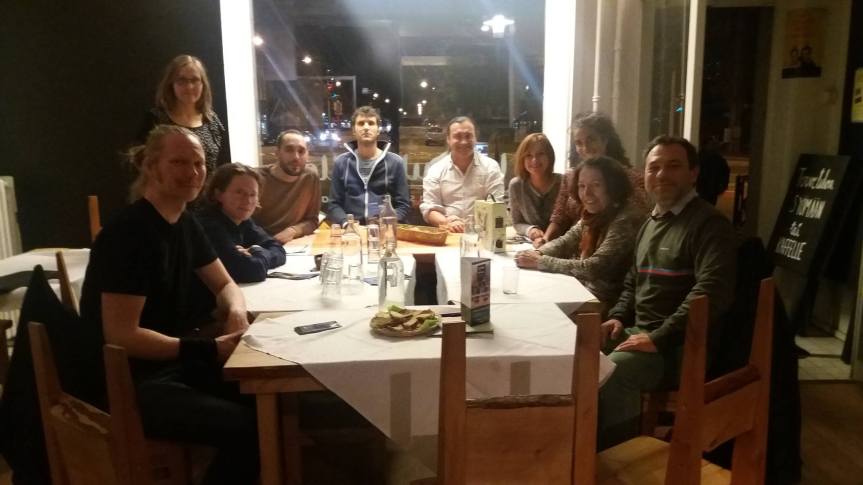
Our last session on Sunday afternoon addressed in different ways the issues of defending and financing our commons: in short, our political aspirations for the other economy and the strategies for resistance in the face of enclosure of our commons.
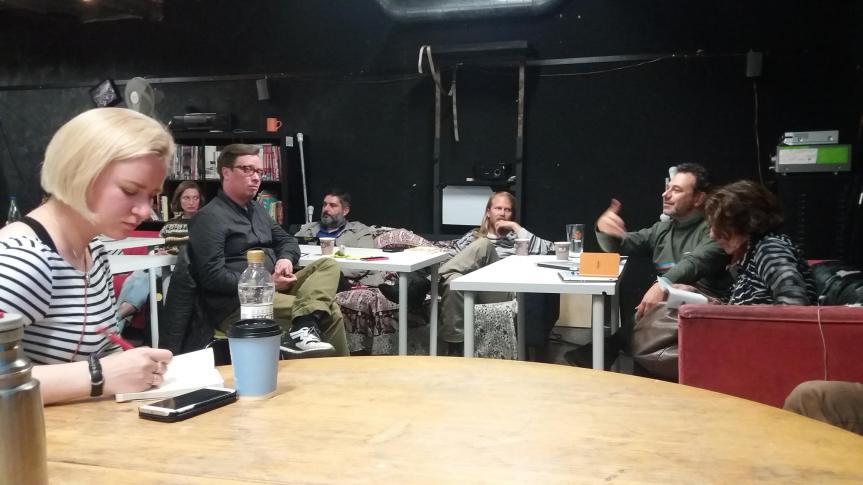
Aslak Holmberg (Saami council) told about the ongoing resistance against Teno River Fishery Agreement, in which some of Saami people reject the decisions and agreement made by the states of Finland and Norway to control fishing and manage the fisheries in the river. Instead, locals are demanding full self-determination claiming their customary law as the relevant right regulating the sustainable use of the river. Resistance was enacted by occupying an island in the river and declaring a moratorium as well as by simply keeping fishing (some individuals even reported themselves to the officials for breaking the law by fishing without licence).
As we heard, forms of resistance can be multiple. Josette Combes (French solidarity economy movement MES) told of a resistance story of French civil society actors who confiscated 196 chairs from banks in Paris symbolising the retribution for the banks’ tax evasion. This led to the banks engaging in extensive actions to regain their chairs, a people’s summit, lots of publicity, and a legal case.
The other half of the session then concerned more the issue of financing and money systems for the commons. Mikko Laamanen (Commons.fi) told more about the Another Financial System and Money for Finland initiative. The session discussed the current interest with City of Helsinki administration for piloting various forms of community currencies running on blockchain technology.
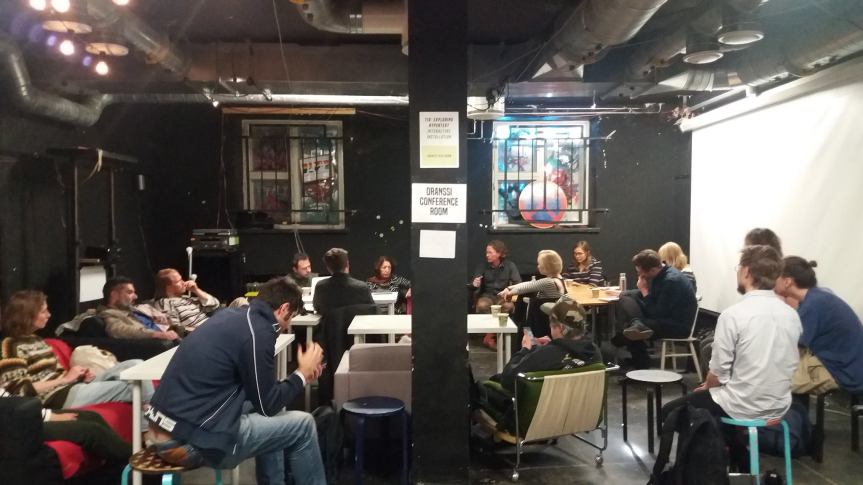
Throughout the weekend the RIPESS team had their own coordination team meetings at the Global Centre (by courtesy of Pro-ethical trade organization Eetti, which has been cooperating with Commons.fi through its participation in the Europe-wide SUSY solidarity economy project). Some of Commons.fi members participated in these meetings.
Different possible converging action points for the coming year were charted: for instance, strengthening efforts to call for a Nordic solidarity economy forum were discussed. Let us see where all this leads us! Commons.fi thanks the RIPESS team for all their contributions and Pixelache for the wonderful space for cooperation before and throughout the festival!
And of course, we danced at Pixelache Festival. 🙂
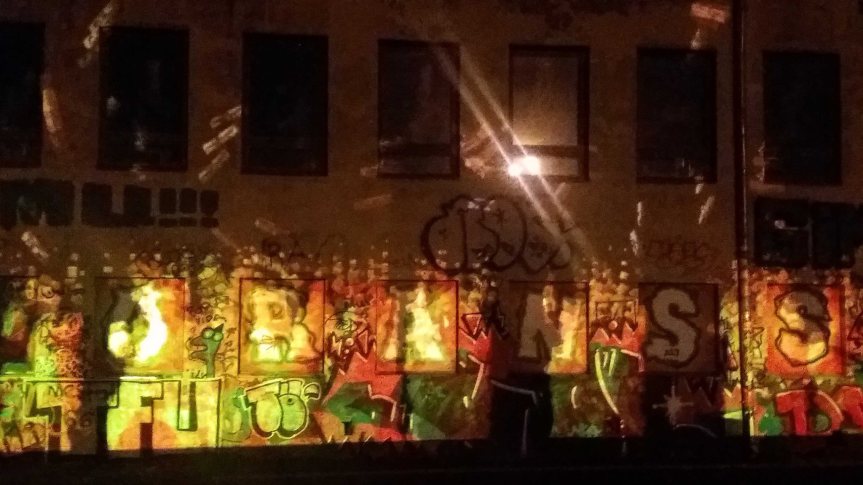
Ruby van der Wekken & Mikko Laamanen
